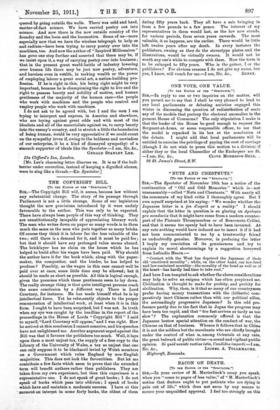THE COPYRIGHT BILL.
[To THE EDITOR OF THE " SPECTATOR.1
SIR,—The Copyright Bill will, it seems, become law without any substantial change. The story of its passage through Parliament is not a little strange. Some of our legislators thought the new provisions introduced by it were unduly favourable to the author. This was only to be expected. There have always been people of this way of thinking. They are constitutionally incapable of appreciating literary work. The man who writes down on paper so many words is to them much the same as the man who puts together so many bricks. Of course they think it is labour far the less valuable of the two ; still there is a demand for it, and it must be paid for ; but that it should have any prolonged value seems absurd. . The bricklayer has no claim on the house which he has helped to build after his wages have been paid. Why should the author have it for the book which, along with the paper. maker, the compositor, and the binder, he has helped to produce P Possibly, as the wages in this case cannot well be paid over at once, some little time may be allowed; but it should be made as short as possible. All this is logical enough, given the premises which these gentlemen seem to lay down. The really strange thing is that quite intelligent persons reach the same conclusion by a different way. There is Lord Courtney, for instance. He has made himself what he is by intellectual force. Yet he vehe,nently objects to the proper remuneration of intellectual work, at least when it is in this form. I ought to have been surprised, but I was not. In truth when my eye was caught by the headline in the report of the proceedings in the House of Lords " Copyright Bill " I said to myself, 'iLord Courtney will oppose," and I was right. How he arrived at this conclusion I cannot conceive, and his speeches have not enlightened me. Another argument urged against the Bill was that it favours the publishers too much. Well,it lays upon them a most unjust tax, the supply of a free copy to the Library of the University of Wales, a tax so unjust that one can only suppose it to be blackmail levied by Welsh members on a Government which rules England by non-English majorities. This does not look like favouritism. But let me contribute a few facts which seem to prove that the extended term will benefit authors rather than publishers. They are taken from my own experience, but then this experience is a representative one. I do not speak of great books ; I do not speak of books which pass into oblivion ; I speak of books which have and maintain a moderate success. I have at this moment an interest in some forty books, the oldest of them
dating fifty years back. They all have a sale bringing in from a few pounds to a few pence. The interest of my representatives in them would last, as the law now stands. for various periods, from seven years onwards. The most valuable, it so happens, are the earlier. There would be little left twelve years after my death. In every instance the publishers, owning as they do the stereotype plates and the illustrations, would be virtually owners. It would not be worth any one's while to compete with them. Now the term is to be enlarged to fifty years. Who is the gainer, I or the publishers P For obvious reasons I do not give my name, but
you, I know, will vouch for me.—I am, Sir, &c., SENSE.


















































 Previous page
Previous page